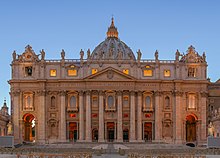| Part of a series on the |
| Catholic Church |
|---|
 |
| Overview |
|
|
| Part of a series on |
| Catholic philosophy |
|---|
   |
In Catholic moral theology, probabilism provides a way of answering the question about what to do when one does not know what to do. Probabilism proposes that one can follow an authoritative opinion regarding whether an act may be performed morally, even though the opposite opinion is more probable. (An opinion is probable when, because of intrinsic or extrinsic arguments, it is able to gain the assent of many prudent men.) It was first formulated in 1577 by Bartholomew Medina, OP, who taught at Salamanca.[1][2]
- ^ Franklin, James (2001). The Science of Conjecture: Evidence and Probability Before Pascal. Baltimore: Johns Hopkins University Press. pp. 74–76. ISBN 0-8018-6569-7.
- ^ Charles Curran, The Origins of Moral Theology in the United States: Three Different Approaches (Georgetown University Press, 1997), 19–20.
© MMXXIII Rich X Search. We shall prevail. All rights reserved. Rich X Search
